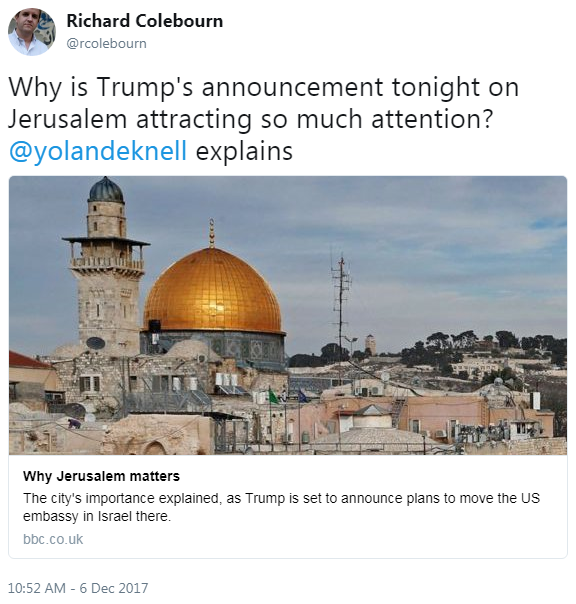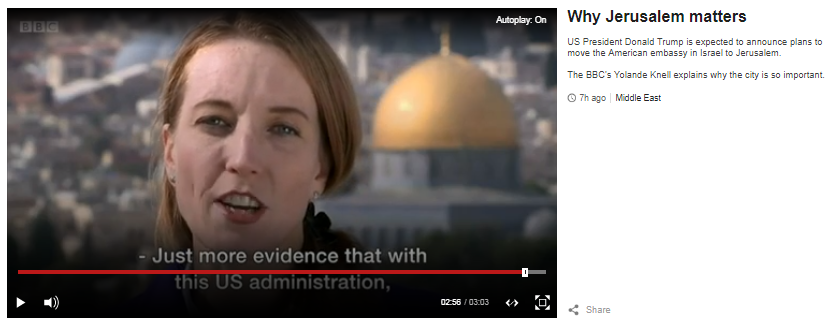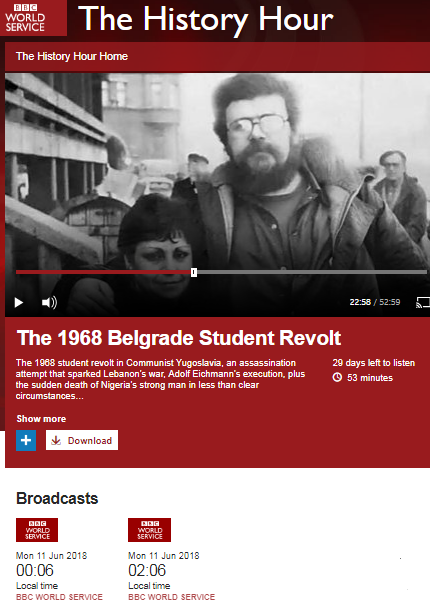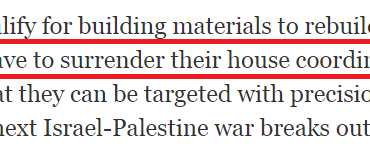On December 6th a filmed ‘backgrounder’ titled “Why Jerusalem matters” appeared on the BBC News website’s ‘World’ and ‘Middle East’ pages.
“US President Donald Trump is expected to announce plans to move the American embassy in Israel to Jerusalem.
The BBC’s Yolande Knell explains why the city is so important.”
The film opens with the Jerusalem bureau’s Knell telling audiences that:
“This ancient city lies at the very heart of the Israel – Palestinian conflict…”
Predictably, Knell did not inform viewers that the Palestinians only began to display an interest in Jerusalem after 1967. Until then – as shown in Article 24 of the original PLO charter from 1964 – the Palestinians specifically stated that they had no claim to territory occupied at the time by Jordan and Egypt and the “Israel-Palestinian conflict” was only about the land on which Israel was established in 1948.
Knell continues with a whitewashed portrayal of Palestinian incitement and violence and no mention of the ‘three days of rage’ announced by Palestinian factions the day before her report was posted.
“…we’ve seen many times how just a small change on the ground here can quickly lead to a flare-up and to violence. So what happens here really does matter.”
She continues:
“Jerusalem’s got great religious significance of course – its Old City has some of the holiest sites for Jews [image of the Western Wall], Muslims [image of Temple Mount] and for Christians [image of the Church of the Holy Sepulchre]. But it’s also got great political significance too.”
Following a caption reading “What does Israel say?”, Knell tells viewers that:
“Most Israelis see Jerusalem as their “eternal, undivided capital”. Not long after the modern state of Israel was created in 1948, the Israeli parliament was set up in the west of the city.”
With no mention whatsoever of the inclusion of Jerusalem in the territory assigned by the League of Nations to the creation of a Jewish homeland, the 1948 Jordanian invasion and subsequent nineteen-year occupation of parts of Jerusalem, the ethnic cleansing of Jews from districts including the Old City or Israel’s warning to Jordan not to participate in the Six Day War, Knell goes on:
“But it wasn’t until the 1967 war with neighbouring Arab countries that Israel captured east Jerusalem, including the Old City, and it later annexed it in a move that’s not recognised internationally. Israeli leaders often vent their frustration that there’s not recognition of full Israeli sovereignty over Jerusalem, particularly from international allies.”
Following another caption reading “What about the Palestinians?”, Knell continues:
“Of course, Palestinians see things starkly differently. They want east Jerusalem as their capital.”
She then goes on to claim that a Palestinian capital in “east Jerusalem” is an already agreed component of the two-state solution:
“And that’s part of the long-standing international formula for peace here, known as the “two-state solution”.
Not for the first time, audiences then see a BBC journalist present the two-state solution in terms that dovetail with the PLO’s interpretation of that term.
“Basically the idea that an independent Palestinian state would be created alongside Israel, along the boundaries that existed before 1967, it’s written up in UN resolutions.” [emphasis added]
In fact the UN – along with the EU, Russia and the US in their ‘Quartet’ capacity – supports “an agreement that […] resolves all permanent status issues as previously defined by the parties; and fulfils the aspirations of both parties for independent homelands through two States for two peoples”. Those “permanent status issues” defined in the Oslo Accords as being subject to negotiations of course include borders and Jerusalem.
Having previously erased the pre-1948 Jewish population of the Old City and other Jerusalem neighbournoods from the picture, Knell continues with a partisan portrayal of ‘international law’:
“About a third of Jerusalemites are Palestinians, some of them come from families that have been here for centuries. And there are lots of ongoing tensions, particularly over the expansion of Jewish settlements in the east of the city, they’re seen as illegal under international law but Israel disagrees.”
After the appearance of the caption “What do international peacemakers say?”, Knell goes on:
“For decades, the international community has been saying that any change in the status of Jerusalem can only come about as part of a negotiated peace deal. So for now all countries with embassies in Israel keep them in or near to Tel Aviv and they just have consulates in Jerusalem.”
As has been the case in additional recent BBC reporting on this story, Knell then went on to present the apparently upcoming establishment of a US embassy in Jerusalem as something related solely to the current US president. Yet again, audiences were not informed of the existence of the US’s ‘Jerusalem Embassy Act of 1995’ and the related June 2017 resolution passed by the US Senate.
“But President Trump is insisting that he does want to move his embassy to Jerusalem. And he’s also said he’s pursuing the “ultimate deal” of peace between Israel and the Palestinians – although he’s not committed to conventional ways of achieving it.”
Viewers then see a clip from February of this year with Donald Trump saying at a press conference:
“So I’m looking at two-state and one-state and I like the one that both parties like. I’m very happy with the one that both parties like.”
With the rest of that statement erased, Knell closes this ‘backgrounder’ with editorialised commentary that promotes a theme pushed by the BBC for months:
“Just more evidence that with this US administration, options that were once seen as off-bounds, off-limits are now up for serious consideration.”
So did this ‘backgrounder’ enhance BBC audience understanding of what this story is about? Obviously not: the omission of essential history and the promotion of partisan portrayals of the two-state solution and ‘international law’ mean that rather than being a ‘backgrounder’, this item by Knell was in fact just one more contribution to advancement of the BBC’s chosen narrative.
Related Articles:
BBC’s Yolande Knell ditches any semblance of impartiality
BBC continues to amplify a political narrative on Jerusalem
The BBC’s partisan portrayal of Jerusalem persists
BBC News amplifies PLO’s interpretation of the two-state solution
BBC News website’s explanation of the two-state solution falls short




